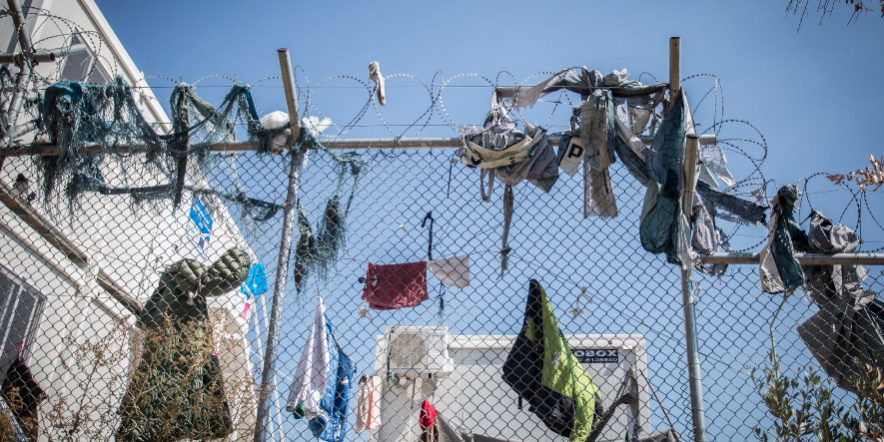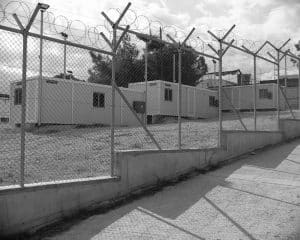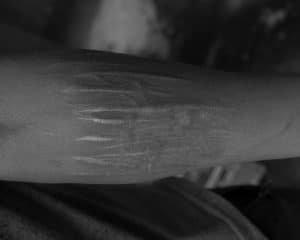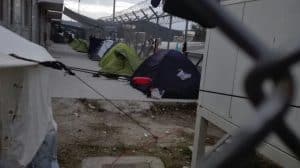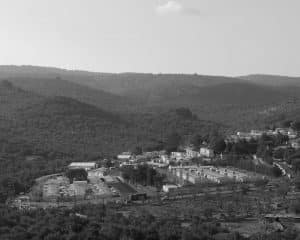During our Monitoring Mission in the Aegean Sea, the Sea-Watch crew has put special attention on the so-called HotSpots. This article gathers reports about the dramatic situation in the biggest of these camps: Moria, Lesbos. We urge the Greek government to close down the prison-like camps and transfer people to the mainland before winter is coming!
In light of the EU-Turkey deal, Moria has become a prime example of Europe’s new refugee policy of exclusion. Once a place of transit, Lesbos has turned into an open-air prison for thousands of refugees seeking a better life. Many have spent months waiting to be granted transfer to the mainland of Greece or to Northern Europe. At current, Moria is severely overcrowded – with 5000 people spilling out of facilities built for only 2300. Numbers are increasing rapidly with more than 120 refugees arriving daily. This leads to problems such as a lack of adequate water and sanitation which contributes to a rapid spread of disease as well as and increased tensions among the inhabitants. The situation is dramatically worsening as winter approaches, and with it, no doubt unnecessary deaths.
A refugee forced to stay in Moria camp reports about the conditions:
[arve url=”https://youtu.be/dgSwp7JjO2Y” align=”right” title=”Exclusive insights into Moria ” /]
“Living in Moria makes us all sick. In the morning you wake up in a cramped tent or container between other people. It smells disgusting and I hate that I cannot even wash myself properly. In winter it is freezing. Everything is soaked. When you wake up you cannot move your limbs. And you’re covered in ashes. Last winter we burned paper and plastic to stay warm. It is as if we were not human beings.”
Video shared with Sea-Watch by a detainee in October 2017
Resistance and Repression
- In July, the Iranian activist Arash Hampay went on hunger strike for a total of 41 days. He demanded the release of all arbitrarily detained refugees and migrants from Section B in Moria, who were presumed innocent and yet were detained without charge.
- On July 18, peaceful protests were staged in front of the European Asylum Support Office inside the camp. Police attacked protesters with tear gas and scuffles ensued. Police then randomly arrested 35 people and brutally beat them.
- Many of the 35 protesters are still under arrest as there is a supposed a danger of escape. Pre-trial proceedings are ongoing.
The arm of a Pakistani refugee shows marks of auto-aggressive behavior. His comment: “It is this life, this place”. Photographs: Roman Kutzowitz.
Mental Health
- A mental health emergency for asylum seekers is unfolding on the Greek islands, largely created by poor living conditions, neglect and violence, according to a report by Médecins Sans Frontières (MSF).
- Severe depressions and self-harming behavior are often the result of these conditions. Media reports from Lesbos include multiple suicide attempts within Moria, none of which seemed to alarm the authorities.
- Pressure from the EU to limit the number of refugees and migrants allowed to leave the islands has broken the system meant to identify torture victims and other vulnerable cases. As a consequence, only a minority of vulnerable people such as unaccompanied minors, pregnant women and new mothers, receive the mental health care they need.
Winterization
- In January 2017, an especially harsh winter swept through the Aegean Sea, leaving the islands covered in snow. Despite repeated warnings by NGOs and local activists, no proper measures to protect those in Moria from freezing, were implemented by the Greek authorities.
- This directly led to seven deaths. In one case, a tent went up in flames as inhabitants attempted to warm themselves with a gas stove, leaving two dead and two severely injured.
- Two others, a 22-year-old Egyptian and a 46-year-old Syrian who shared a tent also died. Greek media reported they had inhaled fumes from a heater, but authorities would not confirm or deny that.
- Activist groups including Sea-Watch have urged the Greek government to take action, fearing a repeat of last winter. Yet, no measures to prepare for winter have been taken so far.
Sanitation
[arve url=”https://youtu.be/_WbGxvquzV4″ title=”Moria Sanitation Facilities” /]
video shared with Sea-Watch by a detainee in October 2017
- Sanitary facilities in Moria are grossly inadequate. Toilets and showers are dirty, dysfunctional and there are simply not enough facilities for the over 5000 people currently living in the containers. For those who have to camp in tents outside of Moria, access is even harder. The crew of Sea-Watch 1 has reports that disabled people in wheelchairs are unable to access facilities. Such access difficulties also put other vulnerable groups, such as women and children, at risk of sexual harassment and violence.
Media Access
- Sea-Watch was not granted access to Moria camp despite repeated requests to the Greek Ministry of Information and the Greek Foreign Correspondents office. In addition, our photographer was detained twice whilst gathering testimonies outside the camp. This shows the just how concerned Greek authorities are to keep the topic out of the limelight. A cynical strategy in light of the suffering of those forced to live here. To counter, we have embedded videos shot by inhabitants of the camp who need to remain anonymous due to police repression.
#MonitoringMoria: The detainee’s view. Our photographer’s view.





